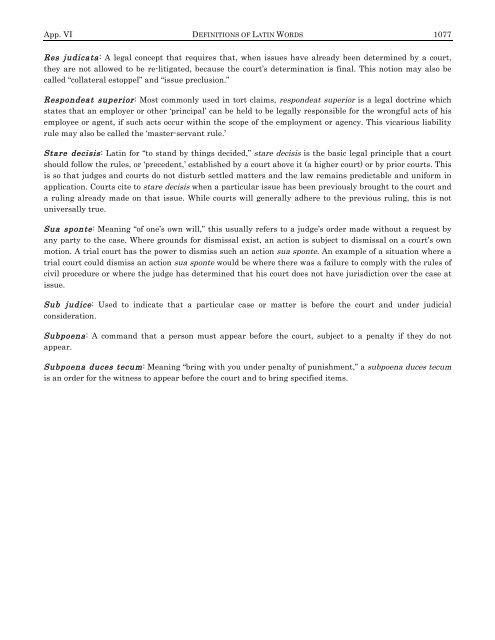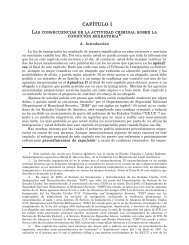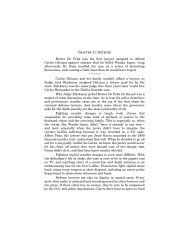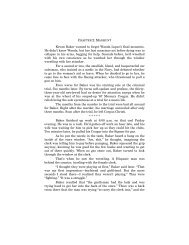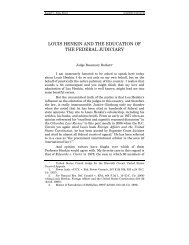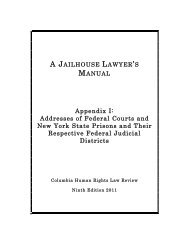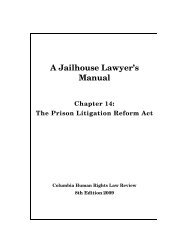Definitions of Latin Words Used in the JLM - Columbia Law School
Definitions of Latin Words Used in the JLM - Columbia Law School
Definitions of Latin Words Used in the JLM - Columbia Law School
Create successful ePaper yourself
Turn your PDF publications into a flip-book with our unique Google optimized e-Paper software.
App. VI DEFINITIONS OF LATIN WORDS 1077<br />
Res judicata: A legal concept that requires that, when issues have already been determ<strong>in</strong>ed by a court,<br />
<strong>the</strong>y are not allowed to be re-litigated, because <strong>the</strong> court’s determ<strong>in</strong>ation is f<strong>in</strong>al. This notion may also be<br />
called “collateral estoppel” and “issue preclusion.”<br />
Respondeat superior: Most commonly used <strong>in</strong> tort claims, respondeat superior is a legal doctr<strong>in</strong>e which<br />
states that an employer or o<strong>the</strong>r ‘pr<strong>in</strong>cipal’ can be held to be legally responsible for <strong>the</strong> wrongful acts <strong>of</strong> his<br />
employee or agent, if such acts occur with<strong>in</strong> <strong>the</strong> scope <strong>of</strong> <strong>the</strong> employment or agency. This vicarious liability<br />
rule may also be called <strong>the</strong> ‘master-servant rule.’<br />
Stare decisis: <strong>Lat<strong>in</strong></strong> for “to stand by th<strong>in</strong>gs decided,” stare decisis is <strong>the</strong> basic legal pr<strong>in</strong>ciple that a court<br />
should follow <strong>the</strong> rules, or ‘precedent,’ established by a court above it (a higher court) or by prior courts. This<br />
is so that judges and courts do not disturb settled matters and <strong>the</strong> law rema<strong>in</strong>s predictable and uniform <strong>in</strong><br />
application. Courts cite to stare decisis when a particular issue has been previously brought to <strong>the</strong> court and<br />
a rul<strong>in</strong>g already made on that issue. While courts will generally adhere to <strong>the</strong> previous rul<strong>in</strong>g, this is not<br />
universally true.<br />
Sua sponte: Mean<strong>in</strong>g “<strong>of</strong> one’s own will,” this usually refers to a judge’s order made without a request by<br />
any party to <strong>the</strong> case. Where grounds for dismissal exist, an action is subject to dismissal on a court’s own<br />
motion. A trial court has <strong>the</strong> power to dismiss such an action sua sponte. An example <strong>of</strong> a situation where a<br />
trial court could dismiss an action sua sponte would be where <strong>the</strong>re was a failure to comply with <strong>the</strong> rules <strong>of</strong><br />
civil procedure or where <strong>the</strong> judge has determ<strong>in</strong>ed that his court does not have jurisdiction over <strong>the</strong> case at<br />
issue.<br />
Sub judice: <strong>Used</strong> to <strong>in</strong>dicate that a particular case or matter is before <strong>the</strong> court and under judicial<br />
consideration.<br />
Subpoena: A command that a person must appear before <strong>the</strong> court, subject to a penalty if <strong>the</strong>y do not<br />
appear.<br />
Subpoena duces tecum: Mean<strong>in</strong>g “br<strong>in</strong>g with you under penalty <strong>of</strong> punishment,” a subpoena duces tecum<br />
is an order for <strong>the</strong> witness to appear before <strong>the</strong> court and to br<strong>in</strong>g specified items.


